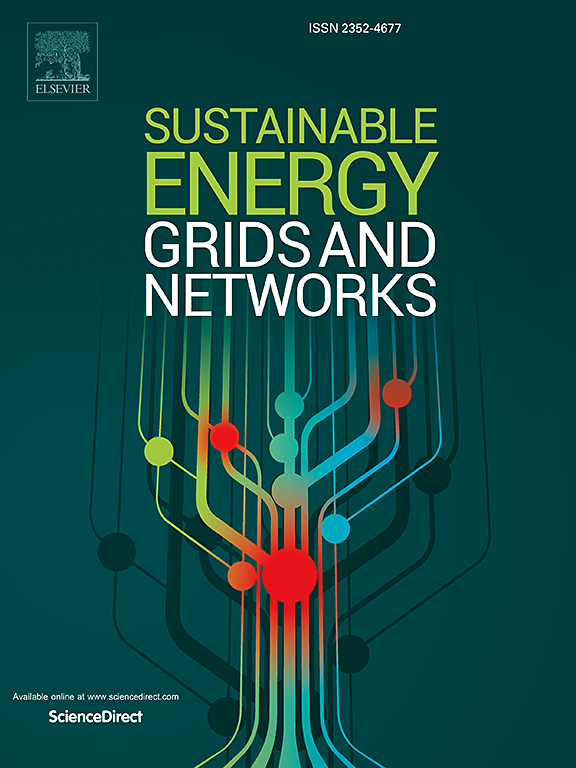一种新型的以用户为中心的分布式多目标能源管理系统
IF 5.6
2区 工程技术
Q2 ENERGY & FUELS
引用次数: 0
摘要
本文提出了一种基于多目标能源管理系统(称为DMOEMS)的分散能源管理方法,该系统专为能源社区(ECs)设计,旨在创建有弹性和可持续的能源系统。DMOEMS集成了一个多目标优化框架,通过使用用户定义的权重因子将相互冲突的目标(最小化电力成本和二氧化碳、减少光伏(PV)弃电和最大化自我消耗)转换为单个目标,从而聚合了这些目标。每个本地控制器根据局部约束和用户偏好优化分布式资产的运行,而EC控制器通过迭代反馈机制协调聚合功率配置。这种协调动态地调整权重因子和缩减策略,以解决电网拥塞而不损害个人隐私。对adehuizen EC的仿真研究表明,DMOEMS可以有效缓解不同运行条件下(电动汽车高充电、正常需求和光伏发电过剩)的过载情况,提高用户满意度,降低运营成本,降低二氧化碳排放。拟议的框架突出了现代欧共体能源管理的民主、分散方法的潜力。使用DMOEMS进行资产管理的数值结果表明,与基线情景相比,DMOEMS在不同方面都有所改善,例如二氧化碳排放量减少了20% %,电力成本节约提高了4% %,光伏弃电减少了30% %。此外,与传统方法相比,DMOEMS中提出的机制通过更快地收敛来解决电网拥塞,从而提高了计算成本。本文章由计算机程序翻译,如有差异,请以英文原文为准。
A novel user-centric decentralized multi-objective energy management system for energy communities
This paper presents a decentralized energy management approach based on a Multi-Objective Energy Management System called DMOEMS, designed for Energy Communities (ECs), aiming to create resilient and sustainable energy systems. DMOEMS integrates a multi-objective optimization framework that aggregates conflicting goals–minimizing electricity cost and CO2, reducing Photovoltaic (PV) curtailment, and maximizing self-consumption–by converting them into a single objective using user-defined weight factors. Each local controller optimizes the operation of distributed assets based on localized constraints and user preferences, while an EC controller coordinates aggregated power profiles through an iterative feedback mechanism. This coordination dynamically adjusts weight factors and curtailment strategies to resolve grid congestion without compromising individual privacy. Simulation studies on the realistic Aardehuizen EC demonstrate that DMOEMS effectively mitigates overloading scenarios across diverse operating conditions (high EV charging, normal demand, and excess PV generation), enhances user satisfaction, reduces operational costs, and lowers CO2 emissions. The proposed framework highlights the potential of a democratic, decentralized approach to energy management in modern ECs. The numerical results for asset management using DMOEMS indicate improvements in different aspects such as reduction of 20 % in CO2 emissions, improvement of 4 % in electricity cost savings, and a 30 % reduction in PV curtailment relative to baseline scenarios. Furthermore, the proposed mechanism in the DMOEMS shows improvement in computational cost by converging faster to resolve grid congestion compared to conventional approaches.
求助全文
通过发布文献求助,成功后即可免费获取论文全文。
去求助
来源期刊

Sustainable Energy Grids & Networks
Energy-Energy Engineering and Power Technology
CiteScore
7.90
自引率
13.00%
发文量
206
审稿时长
49 days
期刊介绍:
Sustainable Energy, Grids and Networks (SEGAN)is an international peer-reviewed publication for theoretical and applied research dealing with energy, information grids and power networks, including smart grids from super to micro grid scales. SEGAN welcomes papers describing fundamental advances in mathematical, statistical or computational methods with application to power and energy systems, as well as papers on applications, computation and modeling in the areas of electrical and energy systems with coupled information and communication technologies.
 求助内容:
求助内容: 应助结果提醒方式:
应助结果提醒方式:


